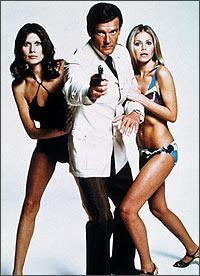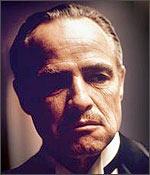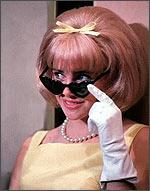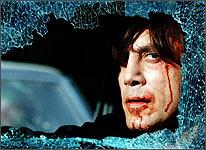|
| Help | |
| You are here: Rediff Home » India » Movies » Columns |
|
This weekend, I was in the mood for James Bond [Images]. Thoroughly underwhelmed by Sebastian Faulks' upcoming novel taking on the character -- don't take my word for it; read an extended extract of it here -- but still in the mood to hear about dinner at Blades, I picked up one of my old tattered-yet-lovely Signet editions of the classic Ian Fleming novels, and devoured The Man With The Golden Gun. It's a fine novel, opening with a brainwashed James trying to assassinate M, then treated with electro-shock therapy and finally sent on a do-or-die suicide mission to go and kill a legendary assassin called Scaramanga. It's always mega to revisit Bond, but the thing that struck me on this reread many years later was how drastically different the film was from this book.
Fleming detailing out a dossier with meticulous precision, or minutely explaining just how bartenders cheat with martinis, might not translate rollickingly enough to screen and that's fair. Yet this book, the last Bond novel, written when Fleming was already thinking silver-screen enough to model his Bond on Sean Connery [Images], makes for a great high-drama plot, perfect for the screen. Instead, the Guy Hamilton film features midgets and random martial arts farce. Gah. It's a tough call, really, translating the written word onto the big screen. Leaving aside basic considerations like length and narrators and internal monologue, the question arises as to how much a book should be changed? And whether a book can, by itself, translate directly onto screen with extreme loyalty? How loyal is too loyal? And where's the fine line separating ingenuity and blasphemy? The Godfather, of course, is the supreme example of cinematic loyalty. According to legend, Francis Ford Coppola ripped a couple of copies of the novel apart and stuck the pages down on massive cardboard sheets, finally bound together to make a gigantic Godfather bible which was carried onto set every day of the filming. Detailed shooting notes would be scribbled all around each page, and so -- while several subplots were trimmed and other crucial ones, like Vito Corleone's story, were bundled into the sequel -- this remains the primo example of a writer's work making it to screen gloriously unscathed.
The film's iconic poster itself defiantly asks 'How did they ever make a movie of Lolita?' How, indeed. Taking one of the finest novels of the 20th century and potentially altering it was no small ask, and Kubrick slyly hid behind Nabakov, collaborating to create an adapted screenplay -- only a bit of which he finally used, while sharing the screenwriting credit (and the possibility of blame) with Nabakov himself. Yet both finished products are masterpieces in their own right, while Adrian Lyne's 1997 film that stayed impressively book-accurate emerged a hardly watchable dud. What worked for Nabakov and then Kubrick was obliqueness and diversion while dealing with a strictly unsavoury subject.
So the question becomes one of capturing the spirit, then, rather than the details. Christopher and Jonathan Nolan's fine adaptation of Christopher Guest's The Prestige is practically a masterclass in making a film dramatically different from the original, yet retaining the freshness and verve of the characters, and the principal conflict. The Coen Brothers took No Country For Old Men and changed the unambiguous ending to a critically acclaimed open-ended one: In the Cormac McCarthy book, Chigurh The Killer is caught, while Joel and Ethan, knee-deep in the plot's nihilism, leave their ending open, and murky. And so well does the film capture the book's essence that McCarthy fans can just assume that Chigurh got nabbed by the cops two minutes after the end credits, and we just didn't get to see it.
I open up this space to you now, dear readers. Write in to me with examples, good and bad, of books being adapted to film, and your thoughts on the questions I'm currently thinking about. There is much I still want to discuss, and over the coming weeks this column will, from time to time, keep revisiting the subject at length -- talking about graphic novel adaptations and Brit Lit given the Yankee makeover for commercial reasons, and a lot more. But do give me a hand so we can pursue the subject more interactively; as always, I'm sure you have a lot to say. And all you others who wanna just rave/rant about anything, write to me as well at senterfold@rediffmail.com. Catch you next week, same Bat-time, same Bat-channel. Ka-pow. | |||||||||||||||||||||||||||||||||||||||||||||||||
|
|
|
| © 2008 Rediff.com India Limited. All Rights Reserved. Disclaimer | Feedback |

 The film, which featured Christopher Lee (Ian's cousin, by the way, and initial choice for the role of Dr No several films ago) as a fine Scaramanga, was a rather silly and comedic Roger Moore starrer which never really worked. Of course all the Bond movies took major liberties with the fabulous texts, but most of these were cinematic.
The film, which featured Christopher Lee (Ian's cousin, by the way, and initial choice for the role of Dr No several films ago) as a fine Scaramanga, was a rather silly and comedic Roger Moore starrer which never really worked. Of course all the Bond movies took major liberties with the fabulous texts, but most of these were cinematic.  The argument then could be put forward that this is merely so because novelist Mario Puzo collaborated with Coppola on the script, but this idea doesn't honestly hold much water since the novelist -- like the screenwriter -- can be completely rogered any way the director wants. Take Stanley Kubrick [
The argument then could be put forward that this is merely so because novelist Mario Puzo collaborated with Coppola on the script, but this idea doesn't honestly hold much water since the novelist -- like the screenwriter -- can be completely rogered any way the director wants. Take Stanley Kubrick [ Nabakov used massive articulate writing, and Kubrick astonishingly lyrical cinema, to the same effect: to steer clear of erotica while staying spiritedly sexy; to sell us the ultimate in loathsome narrators. It's a subject that's easy to sensationalise, and while both the original book and the film are undeniably scandalous, they are never vulgar despite the premise virtually dictating them to be.
Nabakov used massive articulate writing, and Kubrick astonishingly lyrical cinema, to the same effect: to steer clear of erotica while staying spiritedly sexy; to sell us the ultimate in loathsome narrators. It's a subject that's easy to sensationalise, and while both the original book and the film are undeniably scandalous, they are never vulgar despite the premise virtually dictating them to be.  It is a fascinating debate: Do we stick to what we know is already fantastic, and adapt that as straightforward as possible? Or does the filmmaker too assume author status and take just what he likes and create the rest for himself? Should it be like a loyal cover version or should it change the arrangement and reinterpret the song? And does reinterpretation mean it isn't a pure enough adaptation anymore? And when a director bastardises a great novel, what control does the writer have? I open up this space to you now, dear readers.
It is a fascinating debate: Do we stick to what we know is already fantastic, and adapt that as straightforward as possible? Or does the filmmaker too assume author status and take just what he likes and create the rest for himself? Should it be like a loyal cover version or should it change the arrangement and reinterpret the song? And does reinterpretation mean it isn't a pure enough adaptation anymore? And when a director bastardises a great novel, what control does the writer have? I open up this space to you now, dear readers.